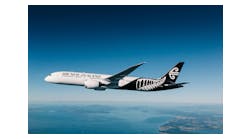July 21--US Airways CEO Doug Parker's is forging a legacy in aviation, rising in a little more than a decade from chief executive of a small airline to soon-to-be head of the world's biggest carrier, but his success stirs up some animosity in Pittsburgh.
Parker is poised to take over the reins of the new airline that will be created when bankrupt American Airlines, the third biggest carrier, completes its merger with fifth-largest US Airways sometime this summer. US Airways shareholders approved the deal on July 12.
But Pittsburgh, which lost 10,000 US Airways jobs and about 460 daily flights since summer 2001, stands to lose again -- and the airline workers, political leaders and others feel betrayed.
"We're the ones who put (Parker) in a profitable position to make a run after American with the sacrifices our people and all the labor groups made coming out of bankruptcy," said Frank Schifano, general chairman of the International Association of Machinists District 142, Pittsburgh, which represents US Airways aircraft maintenance workers.
Workers say US Airways attained the financial health for Parker to strike the American deal from employees' $3 billion in wage and benefit cuts, plus widespread job losses, from bankruptcies in 2002 and 2004. The airline's aircraft maintenance workers in Pittsburgh, for example, fell from more than 3,000 in 2002 to about 700 in 2005.
And more cuts are on the horizon. The flight operations control center in Moon -- a $25 million, taxpayer-subsidized facility that is the carrier's nerve center -- likely will close. The operation and some 600 jobs would move to Dallas, where American has a larger flight center.
Parker, a fast talker with a reputation as a deal maker and financial wiz, was paid $5.5 million as US Airways CEO last year. It's not clear how much he'd make at the new airline. American's current CEO made about $2 million last year, but it was in bankruptcy.
The airline refused requests to make Parker available for comment.
"Parker's point of view is like most in the industry: You can't stay in business if you can't make an adequate profit. He's just more open about it," said William Lauer, a US Airways expert who chairs Allegheny Capital Management Inc., Downtown.
The airline saved a bundle from drastic flight reductions at Pittsburgh International Airport -- a $1 billion facility that Allegheny County built to accommodate US Airways in 1992, mostly to the airline's specifications.
"US Airways should weigh the huge taxpayer investment, in the airport and elsewhere, that was made for them literally over a generation," said Sen. Bob Casey, D-Scranton. "That's why this is a source of great frustration, and frankly some outrage, in the region."
'A pain for pilots'
Opened in 2008, the flight-ops control center in Moon coordinates US Airways' more than 3,000 daily flights and their crews, employing about 600 people. The airline received $4 million in incentives from state and local government.
Once American absorbs US Airways, the facility looks like a goner, say experts, including Parker. The CEO told US Airways workers in Charlotte in late March, "you don't need, nor do you want" two flight-ops centers.
"Dallas has a bigger center, and it's more likely than not" that the one in Moon would close, he said.
"We're certainly working to keep them here and have a good, valid offer for them to keep it here," said Rich Fitzgerald, Allegheny County chief executive, without disclosing details. "We're hopeful but concerned."
Even though the bulk of the bloodletting of US Airways was over by the time Parker arrived as CEO in late 2005, he kept chopping Pittsburgh jobs when he took over.
The airline eliminated 360 bag-handler and gate-agent jobs here in early 2008. US Airways that year transferred about 500 pilot and flight-attendant jobs from Pittsburgh to Philadelphia and Charlotte.
"If you'd told me when I started flying that I wouldn't be based in Pittsburgh anymore, I'd have said you were nuts," said Jack Stephan, former chairman of the Air Line Pilots Association's US Airways unit.
"It's a pain for pilots to fly to Philadelphia or Charlotte to get to work. It disrupts your lifestyle," said Stephan. "Some of the pilots moved because it just got too difficult."
Shooting star
William Douglas Parker, 51, climbed industry ranks quickly, with stints at four airlines. He began his career in 1986 at American -- alongside Tom Horton, American's current CEO.
An MBA graduate from Vanderbilt University, Parker changed airlines in 1991 when he became Northwest Airlines' vice president of financial analysis and assistant treasurer.
The training, especially his financial expertise, led to Parker being tapped a decade later to head America West Airlines, a discount carrier based in Tempe, Ariz.
When he took the top job at financially ailing America West at age 39, Parker became the nation's youngest-ever airline CEO in 2001 -- 10 days before the terrorist attacks pitched the airline industry into a crisis.
Parker secured a $380 million federal loan guarantee to stabilize America West, the only carrier other than US Airways to receive one.
To lead US Airways, Parker agreed to forgo $3.8 million, nearly all in cash, in "change-of-control" severance from America West. Instead, he received stock and stock options that he exercised less than a year later for a $9 million profit.
"He is smart and a good manager," said Schifano. Parker, he said, at least "does listen" to unions' complaints.
"Parker instills a fair amount of confidence. He commands a room when he walks in," Lauer said.
Lauer attributes Parker's rapid rise to his deal-making prowess, his ability to attract talented executives and his knack for raising money for his airlines. For example, Parker in 2008 was one of the first CEOs to impose a bag-check fee -- a tactic that, however unpopular with passengers, became commonplace.
"He's a capable individual and a hard worker," Stephan said. But if you're negotiating with him, "you'd better have your 'A' game on," he said.
In his nearly eight years at US Airways, Parker's total annual pay has varied between $2.5 million and $5.5 million, mostly in securities. His 2012 compensation was 53 percent below the average of other major carriers, said a securities filing.
'The deal maker'
Long a vocal proponent of airline mergers, Parker was at US Airways barely one year when he made a hostile, $8.6 billion bid to acquire bankrupt Delta Air Lines in November 2006. The offer assumed the merged airline would find $1.65 billion in cost savings and revenue.
But Delta spurned the offer, and he withdrew it in January 2007.
Parker made a run at United Airlines in early 2008. The deal hinged on finding $1.5 billion in revenue and cost-savings. That deal dissolved by mid-year when the two could not finalize terms. "In his role at US Airways, he's really the strategist, the deal maker," analyst Lauer said of Parker's urge to merge. "He's been consistent, if nothing else, in attempting to broaden his base."
Lauer said Parker is correct that airline consolidation streamlines costs and raises revenue in the volatile industry.
Stephan said Parker knows well that companies in bankruptcy can shred labor, vendor and other contracts, and use the lower costs to make merger proposals attractive.
"Doug saw that as a model of how you put together a bigger airline," Stephan said, pointing to US Airways' pending tie-up with American. "That's how David was able to go after Goliath."
Thomas Olson is a Trib Total Media staff writer. Reach him at 412-320-7854 or [email protected].
Copyright 2013 - The Pittsburgh Tribune-Review




